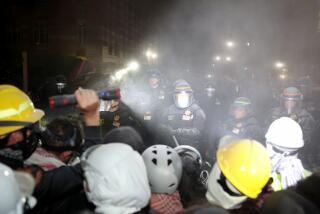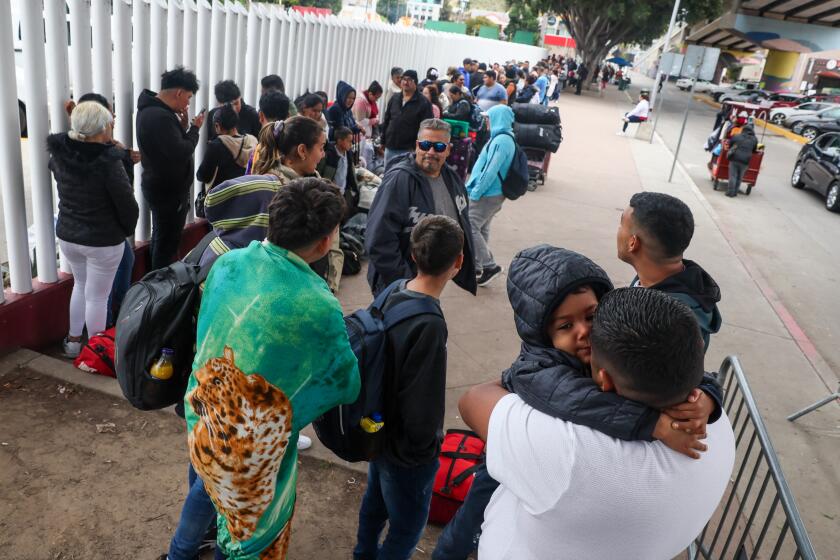The Big Rush for Amnesty Applications Begins Slowly
The rented offices across the Southland--some of the 36 set up from Phoenix to Guam--were not even officially open Monday. Many were still unmarked, unfurnished and smelling of wet paint.
But hundreds of aliens found them anyway, wanting to be the first to pick up the forms--a six-page application, medical exam form, fingerprint card--that could earn them amnesty, and a coveted green card.
This was the official U.S. government paper work that, under a landmark immigration amnesty law, will put them on the path toward legal status in the country where they have lived and worked so long as paper shadows. The law offers legal status to illegal aliens who entered the United States before Jan. 1, 1982, and have lived in the country continuously since then. The application period runs from this May 5 until May 4, 1988.
Manuel Tovalin, 28, of Santa Ana was one of the first to the Santa Ana office on South Ritchey Street, newly leased by the Immigration and Naturalization Service to deal solely with amnesty applications. He first arrived in the United States in 1976, was sent back across the Mexican border in 1979 and now knows what the opportunity for amnesty is worth, he said. A year ago, Tovalin said, he consulted an attorney about obtaining legal residency status, but the lawyer wanted $3,500 in legal fees. “He just wanted my money,” Tovalin said.
On Monday, however, Tovalin left with the forms that could lead to legal status at last.
In Orange County, the crowds of aliens seeking amnesty were small. Hundreds of people awaited the opening of the INS’ Westminster office, but only a handful wanted amnesty forms. The turnouts were even smaller in Garden Grove and Santa Ana.
250 to Be Processed Daily
Dorita Kimble, a deputy legalization officer in the Santa Ana office, said the first week was expected to be slow. However, when all applications are distributed, as many as 250 applicants will be interviewed and processed each day, she said.
It was much the same at other offices in the Southland. “I thought by 8 o’clock we’d be swamped,” said INS employee Arlanda Moore in the East Los Angeles office.
The offices do not officially open to accept applications until May 5, Cinco de Mayo--”a double celebration,” noted Arthur Alvarez, supervisor of the East Los Angeles office. “I wonder if (Washington) thought of that?”
The rented furniture hadn’t arrived and the front door was still locked when people began dropping by the vacant-looking Wilshire Boulevard office building early Monday. But aliens had been assured that the forms would be available regardless.
In East Los Angeles, “we told them we’d be giving out forms if we had to sit out front on the sidewalk,” Alvarez said.
“We’re working with a couple of cardboard boxes and a piece of Styrofoam for a desk,” said Richard Quirk, supervisory legalization officer at the Huntington Park office. “It’s working very well.”
Zoela Ortega and her husband were so eager to apply that they took a dry-run practice trip Sunday so the 34-year-old Salvadoran housekeeper could find the North Hollywood office with no trouble Monday.
“My dream is to be able to buy a house like the houses I clean,” she said. “If we are citizens, we can get better jobs. It is very important to us to walk freely in this country.”
“This day is a beginning for our family,” beamed Roberto Castaneda, 31, a Salvadoran-born janitor who showed up early at the Sepulveda legalization center. His family--wife and three daughters--had taken a mini-holiday and had dressed in Easter Sunday best for the occasion.
“I wanted my children to see the application because I told them that their lives will change if we become citizens,” he explained. “I can get a better job; we won’t have to be afraid to live here any more.”
Jesusa Aragon, 25, of Garden Grove took four forms at the Westminster office--for her mother, herself, her husband and her friend. “I think this is really good. I’m glad that we will be able to get all our (documents) prepared, and we won’t have to worry about getting deported. It will be a big relief.”
Manuel Luna, 24, here nine years ago from Nicaragua and working at the same gas station all that time, had wanted 20 forms as a school exercise for the English class he attends in the morning.
Retired INS agent Joe Bezart, now returned to work at the Wilshire office for this program, said he was sorry, but Luna could not have 20. “Well,” Luna said in ready English as he swung his book bag over his shoulder, “have a nice day.”
Some were fairly confident.
In his 15 years in Los Angeles, Rigoberto de Santiago has worked his way up from teen-age dishwasher to pantry man and wants to go higher--for himself and for his wife and four boys.
“I think I’ve earned it (legalization). I’ve always worked, never asked for government help,” he said. “I hope it does make a difference in my life. . . . I can use my green card to earn more money. (With) the new law, bosses will be asking for green cards, and I’ll be able to show one.”
But “many people from parts of the world came with hopes of a better life; maybe for them this closes the door,” he said. “Perhaps it could be a very sad situation for them.”
One of “them” might be a tiny Guatemalan woman holding the youngest of her five children--and the only one born here. She was picking up forms for her family, including her husband, who cleans rental cars for a living.
He has been here six years, she only two. “I’m afraid a lot because I could lose a lot” by this process. “It’s possible he could qualify and I could have to go.”
By noon, the front door of the Wilshire office had been unlocked and propped open with a bag of quick-drying cement, and about 1,500 applications had been handed out.
A British woman took four--for her husband and herself and extras in case of mistakes.
“I guess we’re just as bad as anyone else,” said the woman, who visited here “dozens of times” before deciding six years ago to stay on illegally.
This Was Cheaper
They had been paying an attorney $3,000 but decided this procedure was cheaper. (Although the INS gives only limited advice, so-called QDEs, qualified designated entities, like certain churches, will help fill out the forms and can charge only up to $100, the INS says.)
“My husband never worries about (illegal status) like I do,” she said. “No employer ever asked me or my husband; they just assume. In L.A., they’re too busy chasing everybody else.”
Americans overreact to immigration, she said. “I think the immigrants are the people that make America great; they’ve only brought good things,” and “the only ones who come here are the ones who are going to work hard.”
Her son was born here, so “he could be President,” she said. But even her cleaning lady--who is also undocumented--doesn’t know about her. And a couple of weeks ago, when a federal agent doing a security clearance check on a neighbor knocked on the door, “my heart just about stopped.”
The agent joked, “ ‘Don’t worry, I haven’t come to arrest you.’ If only he knew what I was feeling!”
Times staff writers Ken Chavez, Stephanie Chavez and David Holley contributed to this story.
More to Read
Start your day right
Sign up for Essential California for news, features and recommendations from the L.A. Times and beyond in your inbox six days a week.
You may occasionally receive promotional content from the Los Angeles Times.







